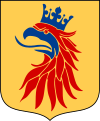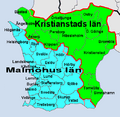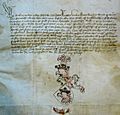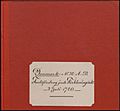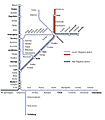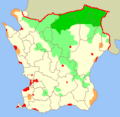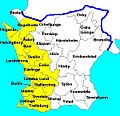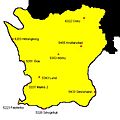Skåne facts for kids
Quick facts for kids
Skåne
|
|||
|---|---|---|---|
|
|||
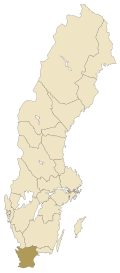 |
|||
| Country | Sweden | ||
| Land | Götaland | ||
| County | Skåne County | ||
| Area | |||
| • Total | 10,939 km2 (4,224 sq mi) | ||
| Population
(31 December 2013)
|
|||
| • Total | 1 274 069 | ||
| Ethnicity | |||
| • Language | Swedish | ||
| • Dialect | Scanian | ||
| Culture | |||
| • Flower | Oxeye daisy | ||
| • Animal | Red deer | ||
| • Bird | Red Kite | ||
| • Fish | Eel | ||
| Time zone | UTC+1 (CET) | ||
| • Summer (DST) | UTC+2 (CEST) | ||
| Area codes | 040–0418 | ||
Skåne (also called Scania) is a special historical region located in the very south of Sweden. It's known for its beautiful flat lands, long coastlines, and rich history. Skåne is a popular place for both living and visiting, offering a mix of big cities and peaceful countryside.
Contents
Discovering Skåne: Location and Size
Skåne is the southernmost province of Sweden. It covers an area of about 10,939 square kilometers. This makes it one of the larger provinces in Sweden. It is part of a bigger land area called Götaland. Skåne is also a county in Sweden, which is how it is governed today.
A Journey Through Time: Skåne's History
Skåne has a very interesting past. For a long time, it was actually part of Denmark. This changed in the 17th century. After several wars, Skåne became a part of Sweden. This historical connection means that Skåne has a unique culture. You can still see Danish influences in its architecture and traditions.
Ancient Times and Early Settlements
People have lived in Skåne for thousands of years. One famous ancient site is Ale's Stones. This is a large stone ship monument from around 500 AD. It sits on the coast and is a mystery from the past. It shows how people lived and buried their dead long ago.
From Danish to Swedish Rule
In the Middle Ages, Skåne was a very important part of Denmark. It had strong ties to the Danish kingdom. Over time, conflicts between Denmark and Sweden grew. The Treaty of Roskilde in 1658 was a major turning point. This treaty officially gave Skåne, along with other nearby regions, to Sweden. The last peace treaty between Denmark and Sweden was signed in 1720.
Nature's Beauty: Animals and Plants
Skåne is famous for its diverse nature. It has many different landscapes. You can find wide fields, thick forests, and lovely coastlines.
Forests and Fields
A common sight in Skåne is the Beech forest. These forests are beautiful, especially in the spring and autumn. The region also has many large fields. These fields are often filled with bright yellow rapefields in the spring. You might also see pruned willow trees, which are typical for the area.
Wildlife of Skåne
Skåne is home to several interesting animals. The official animal of Skåne is the Red deer. These majestic creatures roam the forests. You might also spot the Red kite, which is the official bird. For fish, the Eel is an important symbol of the region. The official flower of Skåne is the Oxeye daisy.
Cities and Landmarks in Skåne
Skåne has many important cities and famous landmarks. These places show both its history and its modern side.
Major Cities: Malmö and Lund
Malmö is the largest city in Skåne. It is a modern and lively city. One of its most famous buildings is the Turning Torso. This skyscraper is the tallest building in Sweden. It has a unique twisted design.
Lund is another important city. It is known for its old Lund Cathedral. The cathedral towers are a famous part of the city's skyline. Lund also has a very old and respected university.
Famous Structures and Transport
The Øresund Bridge is a huge bridge and tunnel system. It connects Malmö in Skåne with Copenhagen in Denmark. This bridge is a symbol of the connection between Sweden and Denmark.
Skåne has a good transport system. The E6 motorway runs through the western part of the province. This road is a main route for travel. The region also has an excellent train service. Many stations are served, making it easy to travel around Skåne.
Historical Buildings
You can find many old and beautiful buildings in Skåne. There are traditional half-timbered farmhouses. These show how people lived in the past. Castles like Vittskövle Castle also dot the landscape. Many medieval churches, like the Old Church of Södra Åsum, are also found here. These churches often show the old Danish Scanian style.
Culture and Dialect
The people of Skåne have their own unique cultural identity. This is partly due to their history.
The Scanian Dialect
The local dialect is called Scanian. It sounds a bit different from standard Swedish. This is because of its strong historical ties to the Danish language. It's a special part of Skåne's heritage.
Traditional Costumes
Skåne also has traditional costumes. These are often worn during special events and celebrations. They reflect the unique history and culture of the region.
Images for kids
-
Letter from Eric of Pomerania dated 1437, with a description of the arms granted to the city of Malmö.
-
Ale's Stones, a stone ship (burial monument) from c. 500 AD on the coast at Kåseberga, around ten kilometres (6.2 miles) south east of Ystad.
-
Aerial view of Scania near Lund
-
A typical Beech forest, the Western edge of Karlslund in Northern Landskrona
-
Pruned willows and rapefields are typical for this area of Sweden.
-
Map of the 33 municipalities of Scania. The western, yellow coloured municipalities, close to Øresund, have much higher population densities than the eastern ones
-
Eslöv church, built 1890 in Neo-Gothic style, sometimes known in Swedish as Eslöv Gothic.
-
The Øresund Bridge
-
The Annehem neighborhood in Lund
-
The Turning Torso in Malmö, the tallest building in Sweden.
-
The house of magistrate Jacob Hansen in Helsingborg, built in 1641.
-
The Old Church of Södra Åsum in Sjöbo Municipality — a typical example of a medieval Danish Scanian church.
See also
 In Spanish: Escania para niños
In Spanish: Escania para niños
 | Selma Burke |
 | Pauline Powell Burns |
 | Frederick J. Brown |
 | Robert Blackburn |



